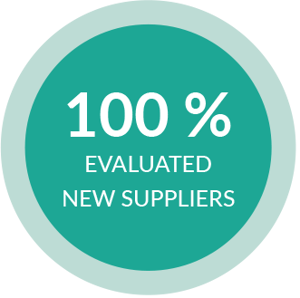Sustainability
Governance information
Sustainability in the supply chain

Impacts, risks and opportunities
About 90 percent of our sales are generated from distribution and 10 percent from own production. Our negative sustainability impact is therefore mainly indirect, through business relationships with our suppliers, and is concentrated in the upstream value chain. This is particularly the case for mining and oil extraction, which use fossil fuels, pollute the local environment and often take place in countries with low respect for human rights, poor protection for workers and a high risk of corruption. The consequences of the final production of the more complex products we distribute are deemed to have a lower negative impact on people and the environment, as they often take place in countries with good environmental protection, high respect for human and labour rights and a lower risk of corruption. The consequences of the final production of consumables and other simple products can have a greater negative impact on people and the environment, depending on where in the world they are produced.
The expected financial consequences of AddLife's significant sustainability risks primarily concern sustainability-related legislation, which affects all companies in the Group. In particular, the EU directive on corporate due diligence regarding sustainability may, in the medium and long term, have adverse effects on AddLife's financial position and performance, especially through increased costs to address negative impacts on people and the environment along the supply chain.
 Strategy and governance
Strategy and governance
AddLife manages sustainability initiatives within the supply chain through our group-wide Code of Conduct for Business Partners. Our goal in 2023 was to evaluate all new suppliers from a sustainability perspective, using a risk assessment tool we developed. We achieved this goal during the year. AddLife has approximately 7,000 suppliers of products and materials, and probably many more subcontractors. In our decentralised business model , the subsidiaries are responsible for their suppliers, which makes it more challenging to identify and manage sustainability-related risks. In 2023, AddLife implemented a group-wide system for identifying, assessing and managing sustainability-related risks in the supply chain. The work will continue throughout 2024, in parallel with our development of the due diligence process regarding sustainability, which will be implemented across the entire group.
 SUPPLIER TARGET
SUPPLIER TARGET- Evaluate 100% of our new suppliers from a sustainability perspective in 2023
Metrics
| Evaluation of new suppliers based on sustainability criteria | 2023 |
|---|---|
| Share of new suppliers evaluted based on sustainability criteria | 100% |
Anti-corruption
Impacts, risks and opportunities
AddLife's negative impact through corruption is mainly concentrated within the supply chain, although the risk of corruption also exists within public procurement. The risk of corruption in the supply chain depends on where in the world the products are manufactured. The risk is particularly high in the extraction of raw materials in the mining and oil industry, and slightly lower in the manufacture of materials, components and products. Public procurement is considered to have a relatively high risk of corruption, especially after a contract has been concluded, as contract monitoring and management are often neglected in the public sector.
Strategy and governance
In 2023, several subsidiaries have joined our group-wide whistleblowing channel, which enables anonymous reporting of suspected corruption or other breaches of the Code of Conduct. We have zero tolerance for corruption as well as for deviations from our Code of Conduct, which is an important commitment in our sustainability work. It is also a commitment to our suppliers, who entrust us with their brand, and to our customers, who rely on fair and long-term business relationships.
In 2022, we launched an updated code of conduct for our employees, based on the UN Global Compact, the ILO Core Conventions and the OECD Guidelines for Multinational Enterprises. All employees receive training on this topic through our digital training system at AddLife Academy. Employees have an obligation to live up to the Code of Conduct and to reflect it in their work and in their relations with colleagues and the community. By 2023, 97% of our employees had completed this training.
Metrics
| Corruption and bribes | 2023 |
|---|---|
| Number of convictions or violation of anti-corruption and anti- bribery laws | 0 |
| Amount of fines for violation of anti-corruption and anti- bribery laws | 0 |
| Total number of confirmed incidents of corruption or bribery | 0 |
| Number of confirmed incidents in which own workers were dismissed or disciplined for corruption or bribery-related incidents | 0 |
| Number of confirmed incidents relating to contracts with business partners that were terminated or not renewed due to violations related to corruption or bribery | 0 |